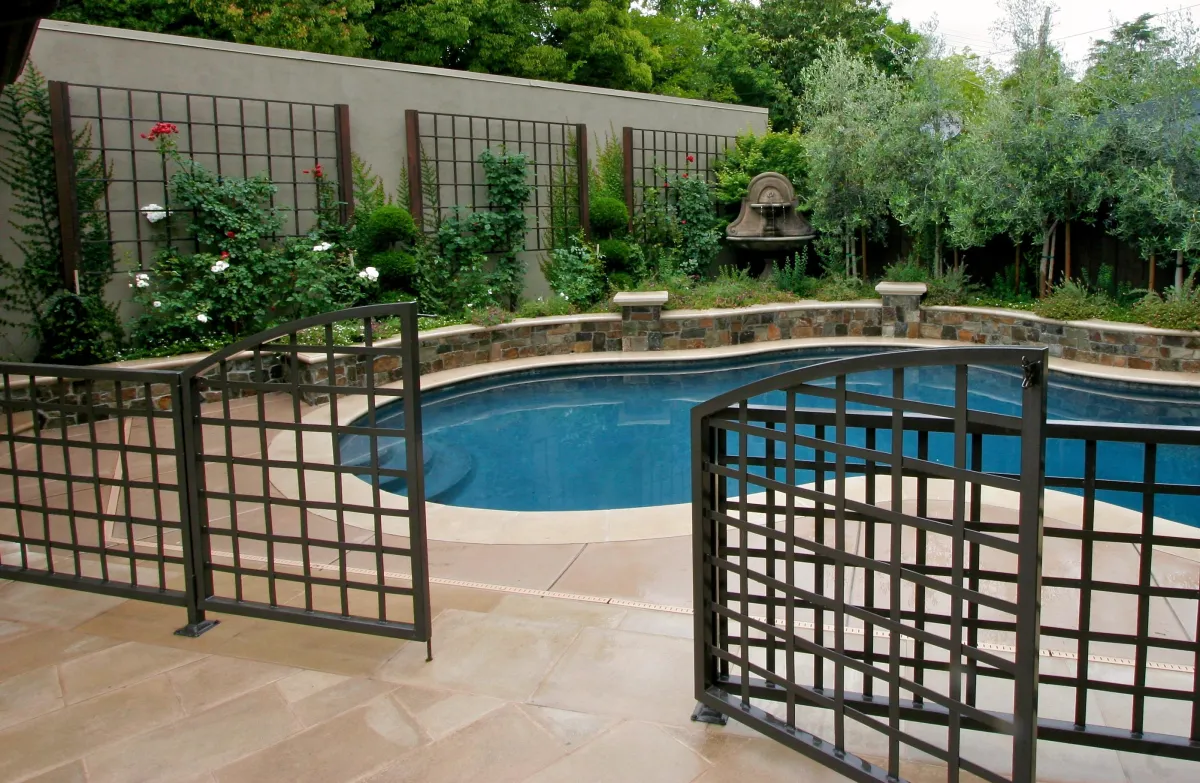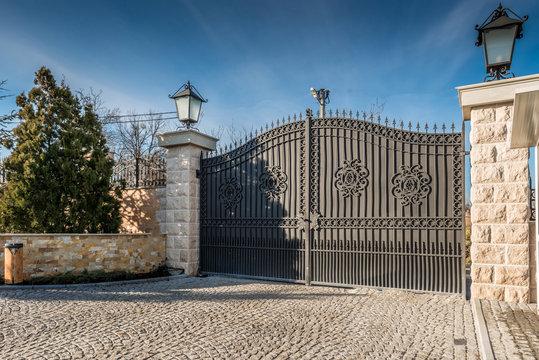
Houston Automatic Gate Compliance: Permits, Safety Standards & Legal Guidelines for Houston and Surrounding Areas
Serving Houston and Surrounding Areas Throughout the Greater Houston Region
Automatic gates bring enhanced security, convenience, and aesthetic value to residential and commercial properties in Houston and surrounding areas. From suburban communities to expanding commercial zones, compliance is critical to ensure gates are safe, legally installed, and accessible to emergency responders.
Whether you're installing a new system or upgrading an existing one, overlooking Houston’s permitting process, UL 325 and ASTM F2200 safety standards, or local fire access regulations can lead to steep penalties and operational risks. This comprehensive guide addresses key questions about permits, safety standards, and legal responsibilities for automatic gate systems—helping property owners across the Greater Houston area stay compliant, protected, and worry-free.
What types of permits are needed for automatic gates in Houston and nearby towns like Cypress and Katy?
In Houston and surrounding areas, installing an automatic gate typically requires three permits. A building permit covers the structural elements, such as posts, supports, and gate frames. An electrical permit is necessary for all wiring, motor, and automation components. Lastly, a fire access permit is required for any gated property—especially in residential communities or commercial areas—ensuring emergency responders can gain entry quickly and safely.
How does the Houston Permitting Center process gate permits?
The process begins by submitting site plans, elevation drawings, and electrical schematics to the Houston Permitting Center. The city then verifies compliance with property line setbacks, electrical safety requirements, and emergency access rules. After initial approval, inspections are completed in phases: foundation inspection for post footing, rough-in inspection for wiring and motor placement, and a final inspection to confirm overall safety and code compliance. This multi-step process applies to Houston as well as nearby cities like Sugar Land, Spring, and The Woodlands. However, in unincorporated areas like parts of Katy or Cypress, permit applications may be handled by county permitting departments.
Do you need a permit to repair or modify an existing automatic gate?
Yes—permits are required if the repair alters the gate’s structure or automation systems. For example, if you're replacing or modifying support posts, changing the gate's dimensions, or upgrading the motor and electrical components, you'll need a new building or electrical permit. These permits ensure that even after repairs, the system continues to meet safety codes and local ordinances.
What is UL 325 and how does it apply to automatic gates in areas like Pearland or League City?
UL 325 is a nationally recognized safety standard that governs how gate operators must function. It requires systems to include entrapment protection sensors that can detect obstacles and reverse gate movement, clearly labeled emergency stop controls, and visible warning signage. In residential settings (Class I), the requirements are slightly less complex than in commercial or industrial settings (Classes II through IV), where higher safety standards are enforced.
What is ASTM F2200 and why is it important for gate systems?
ASTM F2200 is the standard that defines the physical design and construction of automated gates. It specifies important safety measures such as minimum clearance to prevent pinch points, limits on how fast and how forcefully a gate can move, and the requirement for manual release features in the event of a power failure. This standard ensures physical safety for pedestrians and vehicles and is required in Houston and surrounding towns including Fulshear, Cinco Ranch, and The Woodlands.
What is the requirement for 9-1-1 key boxes on automatic gates?
The Houston Fire Department’s Life Safety Bureau mandates that any automatic gate controlling access to emergency routes must include a 9-1-1 key box. This box must be mounted on the secure side of the gate, placed between 48 and 60 inches above the ground, and located within one foot of the gate’s hinge. It must also provide a manual override so emergency personnel can open the gate even if power is lost. This requirement is enforced throughout Greater Houston, including cities like Missouri City, Tomball, and Cypress.
What are the required dimensions for gates to allow fire truck access?
Fire access gates must meet minimum clearance guidelines to accommodate emergency vehicles. For private residential driveways, the gate must be at least 10 feet wide with a vertical clearance of 13 feet 6 inches. For fire apparatus access roads, the gate width must be a minimum of 20 feet, and vertical clearance must be at least 14 feet 6 inches. These dimensions are critical for ensuring safe and efficient access across all areas in the Houston metro region.
What are the gate setback and height regulations in Houston?
Houston requires automatic gates to be set back at least five feet from the public right-of-way to prevent obstruction of sidewalks and roads. For residential properties, the maximum allowable gate height is typically six feet, while commercial properties may install gates up to eight feet tall. These regulations ensure consistency in neighborhood aesthetics, improve visibility, and enhance overall safety.
How do regulations differ in surrounding areas like unincorporated Cypress, Katy, or Fulshear?
Surrounding areas that fall outside Houston city limits may have slightly different zoning laws and permitting procedures. For example, in Fort Bend County (covering parts of Katy and Fulshear), gates may only require a four-foot setback and must go through the county engineer’s office for approval. It’s important to verify local requirements before beginning installation or repairs to avoid compliance issues.
Are there different gate design standards for residential versus commercial properties?
Yes, there are significant differences. Residential gates often use materials like steel, aluminum, or treated wood, and they can feature decorative designs as long as they meet UL 325 Class I standards. Commercial gates, on the other hand, typically use industrial-grade materials and must comply with UL 325 Class II, III, or IV standards, which include more robust safety mechanisms and stronger construction to withstand higher usage.
Final Thoughts
Ensuring your automatic gate complies with Houston’s regulations—and those of surrounding areas like Cypress, Katy, Tomball, Sugar Land, and The Woodlands—is essential for safety, legal operation, and long-term reliability. From securing the proper permits to meeting UL 325 and ASTM F2200 safety standards and installing required emergency access features, every step matters. Non-compliance can lead to costly fines, failed inspections, and compromised emergency response. Working with experienced, licensed professionals ensures your gate is not only functional but fully aligned with local codes, giving you peace of mind and protecting your investment.

Do I need a permit for replacing an existing gate motor in Houston?
Yes, if you're replacing or upgrading a gate motor or making any changes to the electrical system, you'll need an electrical permit to ensure the work complies with Houston’s building and electrical codes.
Can I install an automatic gate myself, or do I need a licensed contractor?
While it’s legal to do some work yourself on private property, licensed contractors are required for systems involving electrical work, fire access components, or integrated security features—especially in commercial settings or HOA communities.
How long does it take to get gate permits approved in Houston?
Permit approval times vary, but most residential applications are reviewed within 5 to 10 business days, assuming complete documentation. Complex commercial projects or those requiring fire access approval may take longer.
What happens if my gate fails a city inspection?
If your automatic gate fails inspection, you’ll receive a correction notice detailing what must be fixed. After making the necessary changes, you can request a re-inspection. Repeated failures can delay the use of the gate and may result in fines.
Are solar-powered gate systems allowed under Houston code?
Yes, solar-powered gate operators are permitted, but they must still meet all applicable UL 325 and ASTM F2200 safety standards and be installed by a qualified professional if connected to any security or monitoring systems.

Contact Us
Terms & Conditions
Privacy Policy
Email: [email protected]
Phone: (346) 507-6303
Address: 4722 Magnolia Creek Road, Houston, TX 77084